M-CORES: SWC Corridor Taskforce Rolls Back FDOT's Vision of Consensus
Posted October 21, 2020 03:40 pm
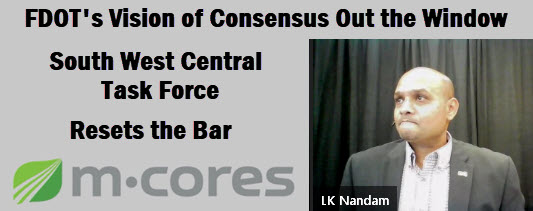
Secretary Nandam as he saw consensus slipping
away.
Screen shot Observer Graphic
FDOT VIRTUAL UNIVERSE – On Monday, from 9:00 am to 11:07 pm, the South West Central (SWC) M-CORES Task Force met in its final session to agree on a report to send to the Florida Legislature. DOT did not get the stamp of approval it wanted.
 The
Multi-use Corridors of Regional Economic
Significance (M-CORES) is a political piece of
legislation hatched by the 2019 Florida
Legislature to build three toll roads with a
total estimated length of about 330 miles. The
legislation was produced without an escape hatch
or a "No-Build" option. The estimated cost of
the roads is anywhere between $10 bil to $25 bil.
The
Multi-use Corridors of Regional Economic
Significance (M-CORES) is a political piece of
legislation hatched by the 2019 Florida
Legislature to build three toll roads with a
total estimated length of about 330 miles. The
legislation was produced without an escape hatch
or a "No-Build" option. The estimated cost of
the roads is anywhere between $10 bil to $25 bil.
Led by then Republican Florida Senate President Bill Galvano, the M-CORES legislation was pushed through the legislature without Florida Department of Transportation (FDOT) consultation. The corridors were not in any of its work plans. It was just dropped in its lap as a political hot potato. The state does not know how it is going to fund the roads.
A year-and-a-half-ago, FDOT Secretary Kevin Thibault appointed the members of the SWC M-CORES Task Force. The membership is an eclectic group, including environmentalists, local elected government officials, appointed government officials (folks from the planning councils and water management districts, and others), liberals, and conservatives.
The two other corridors, the Suncoast and the Northern Extension, have similar mixes of task force members. Over time, the SWC has been at the forefront of defining the substance, level, and variety of conversation.
After Monday's 14 hour day, the SWC Task Force caused FDOT's District I Secretary and Task Force Chair LK Nandam to blink and roll back the bar on FDOT's consensus definition that was established over a year-and-a-half ago.
What is (was) DOT's Definition of Consensus?
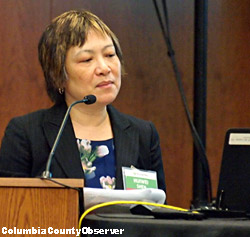
FDOT Chief Planner Huiwei Shen
File photo
FDOT's Chief Planner Huiwei Shen was FDOT's front person on consensus. It is not clear how Ms. Shen or FDOT came up with its particular vision of consensus.
During the September 23, 2020, SWC M-CORES Task Force meeting, Ms. Shen explained consensus. She told the Task Force she would explain what the Task Force agreed was the definition of consensus.
While FDOT may have agreed on a definition of consensus, the Task Force had never decided on any definition, nor was it asked to agree.
Ms. Shen said, "Let me remind you of the definition of consensus we agreed upon at our first meeting. The Task Force will strive for consensus on the recommendation as a package to be included in the final report. Consensus will be defined and documented as a member being able to support, accept, live with, or agree not to oppose the package of recommendations for the final report."
She reiterated, "We want to be sure that everyone here is able to support, accept, live with, or agree not to oppose the package of recommendations as a whole. We all should be able to live with or agree not to oppose the package as a set."
September 23, 2020: SWC's Heavy Lifting on Consensus
No-Build has been an issue throughout the lifetime of the M-CORES. Many Task Force members wanted a no-build option in the Task Force final report, as well as numerous outside groups which have opposed spending millions of dollars planning for roads which they say shouldn't or will never be built.
Without a no-build option, it was clear that FDOT's definition of consensus was a mile-high hurdle.
Tallahassee's politicians designed the M-CORES legislation without a no-build option, which has left FDOT scrambling to find a place to put it, or at least explain it away.
On September 23, 2020, Audubon's Dr. Paul Gray told his fellow Task Force members, "It might be useful to have a definition of what no-build is... get some more clarity on what a no-build option actually means."
FDOT's Shen explained, "No-build means no major capacity investments beyond those that are already committed in our (FDOT's) program... Maybe put it in the glossary. It would be part of the appendix for the report."
FDOT's facilitator added, "The program itself could continue to go forward; there may be a no-build in certain areas."
Secretary Nandam said, "Evaluation of the no-build alternatives will also include not only transportation, but the other things. It may be a combination of things that could be resolved... Keep that in mind as we are talking about the no-build option."
Task Force member Bill McDaniel, Collier County Commission Chair and Regional Planning Council representative, said, "We spoke about it when we had our staff meeting. I think it imperative that the segregation, the definition of no-build, is brought forth and fortified..."
Task Force member and Defenders of Wildlife representative Elizabeth Fleming expressed the exasperation of many, "I actually thought that I understood what no-build meant, and now I'm confused... Usually, there is a need for a road identified, and then the planning goes forward. There are several alternatives, and one of those alternatives is a no-build option. That means the project doesn't move forward. The fact that this one could move forward or certain modes could move forward... I am trying to make it crystal clear that there is some confusion on my part."
Ms. Fleming was not alone.
FDOT Scrambling to Finish Final Report
Secretary Nandam Scraps FDOT's Rules of
Consensus
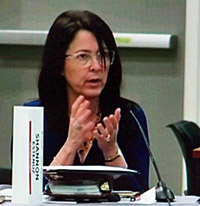
Shannon Estenoz
FL Channel
The Southwest Central Corridor Task Force's Monday 14 hour marathon boiled down to poor timing by FDOT, and many members complained about the lack of review time.
Task Force members needed to incorporate last-minute changes into a final report of which the DOT was looking to have approved by consensus at the end of the Monday meeting.
Task Force member Collier County Commissioner Penny Taylor expressed the thoughts of many, "After our year and a half, protecting the environment is for me, the denominator..."
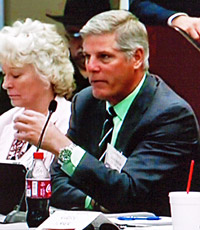
Andrew Dickman
FL Channel
1000 Friends of Florida Task Force member Andrew Dickman agreed.
Shannon Estenoz, representing the Everglades Foundation, wanted to know about financial feasibility and inquired about the amount of funding that would have to be generated to fund the project.
No one knew.
Mr. Dickman agreed.
Hours later, Ms. Estenoz again brought up the question of funding, and again the answer was similar.
Ms. Estenoz said, "If you can't afford to do it right, you can't do it."
Twelve hours after the meeting began, Task Force members were complaining of exhaustion. FDOT ignored the complaints and didn't offer the Task Force members a break through the meeting's end, 4 hours later.
After an extended day, the night arrived.
Secretary Nandam explained to the Task Force that he (FDOT) was not asking for an "up or down vote" as he recited the consensus rules: a member being able "to support, accept, live with, or agree not to oppose the package of recommendations for the final report."
Many members of the Task Force balked. The conversation went on for hours.
It became clear to Secretary Nandam and everyone else that FDOT's definition of consensus would not carry the day or the final report to the Governor.
Secretary Nandam finally asked for agreement that the report would just be approved as "final" and transmitted to the Governor.
It was touch-and-go, but the Task Force agreed that the report was done. The Secretary looked relieved and also agreed the report was done.
Epilogue
Yesterday, The Suncoast Task Force had a meeting which turned into another marathon, ending at 9:55 pm, an hour and twelve minutes less than the Southwest-Central.
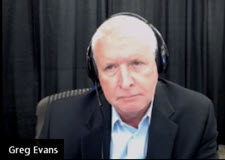
Greg Evans, wasn't talking about consensus last
night.
Screen shot
FDOT and District II Secretary Greg Evans proved to be quick learners and dropped FDOT's prior definition of consensus, and only looked for agreement to pass the report along.
When Task Force members asked what happened to FDOT's consensus rules, Secretary Evans just ignored the question and asked for authorization to pass on the report.
After more discussion, he got it.
